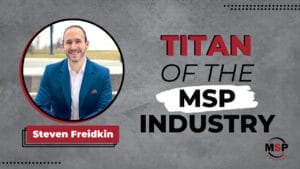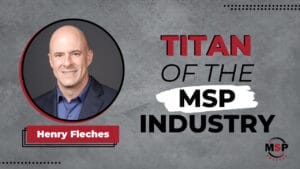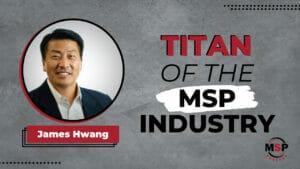From sweeping warehouse floors to $50 million in revenue, Will Slappey is the epitome of growth in the MSP space
Note: This article is taken from a live interview and has been edited for clarity and length.
Will Slappey grew up in his father’s IT company in the 1980s, sweeping warehouse floors, running cabling and filing paper tickets. In 2019, Will officially became CEO of his father’s company. He secured private investment and grew the family business from 35 employees and $6.5 million in revenue to an astonishing 255 employees and $50 million in revenue in 2023.
Robin Robins, founder of MSP Success Magazine and Big Red Media, spoke with Will to understand how he managed 18 acquisitions in three and a half years to achieve remarkable growth and how learning from the past helps him make intelligent business decisions for the future.
Robin Robins: Your dad founded IT Voice in the ’80s, but you’ve initiated tremendous growth in the last few years. Tell me about how you got started and the backstory of the company?
Will Slappey: My father founded the company in the 1980s, and I grew up in and around the company. Even when I was in middle school and high school, I would go to IT conferences. I still have a lot of peers in the industry who I’ve known since I was in middle school. I grew up in the company, and then later I came on board full-time. I never set out to take over the company – it just happened bit by bit. I was going to law school, which is a long story, but I changed paths and went to work for my dad. The next thing I know, I’m running the day-to-day operation.
I’ve been running things since 2014, but I officially became CEO in 2019. Before that, we were about 35 employees and $6.5 million in revenue. Part of the transitional plan was that my father wanted an opportunity to take some chips off the table. We brought in some outside investment, so it’s quasi-PE-backed in terms of how we’re set up. But it’s a private group of people – it’s not a big fund. With that private group, we went down the acquisition route. We made 18 different acquisitions in about three and a half years, and that’s how we got to where we’re expected to break the $50 million mark this year.
Robin: Last year alone, you had nine acquisitions. What’s your plan for 2023 and 2024?
Will: We doubled in size last year, and a lot of that was through acquisition. So, this year, we’re focused on getting everybody integrated. An employee asked me why we don’t have bigger growth goals this year. But there’s some limit to what we can do on organic growth while simultaneously bringing everybody together after the acquisitions.
Robin: I’ve talked to a lot of industry leaders, and the numbers agree – MSPs are growing. The average MSP grew 23% last year, compared to 8% or 9% before 2020. Do you see a lot of opportunities for MSPs, and where are you seeing them?
Will: Certainly we’re in some market adjustment right now or whatever you want to call it. History tends to repeat itself, and historically, where I’d see opportunity is in co-managed or outsourced IT. I think that’s creating a lot of opportunities for the MSP world, whether co-managed or fully managed IT. There are a lot of people looking to outsource their IT, so I think the next couple of years will be really strong from an opportunity perspective.
There’s also a lot of opportunity to be had within the components of an MSP. Voice, cyber security, compliance, cloud, consulting, application development – there are a lot of sister industries, so to speak, connected to MSPs. For us at IT Voice, we’ve acquired companies with built-in core competencies and expertise we didn’t necessarily have. Now we can cross-sell that into our existing customer base. Acquiring a new customer is very expensive, so there’s a lot of opportunity to look at low-hanging fruit for your existing customer base.
The other opportunity we see is in small and medium markets with 100,000 to 500,000 people. The competition is not nearly as stiff as Chicago, Atlanta or Dallas. The adage goes, “It’s better to be a big fish in a little pond than a little fish in an ocean.” I think there’s a lot of opportunity in more rural America, and I think cyber security is driving this – where, historically, they might have had no MSP, but now they’re beginning to take it more seriously.
Robin: You mentioned the high costs of client acquisition. I know that’s a challenge for many smaller MSPs right now. What are other threats in the industry?
Will: There’s a massive amount of consolidation. Ten years ago, if you sold your MSP, there was a sense of “You’ve betrayed us; you’ve gone to the dark side.” It’s so normalized today, a massive amount of consolidation is happening right now, and more is coming.
From a client acquisition standpoint, if you’re a small MSP, you will have to compete against bigger MSPs. Ten years ago, it was all about customer service, and it still is today. Still, it’s getting more complex with the cyber security threats out there for those sub-$1 million companies to have the expertise on staff to ensure their customers have what they need. That’s going to be a real challenge for a lot of them. In the coming years, there will be more Titans in the industry, and I think the competitive landscape will change. If you’re a smaller MSP out there, I’d ask, “Are you prepared? What are you going to do to become more efficient? And how do you position yourself to sell?” One strategy is to become a platform yourself and grow or ensure you know your position to compete as the market changes.
Robin: Two other challenges for MSPs that are top of mind right now are increasing inflation and the fight for technical talent. Big companies in different markets are recruiting engineers, not just other MSPs. How are you combating those challenges?
Will: We’ve always had a good built-in process where we increase our rates with customers every year and help them understand that part of that is about labor. Of course, we’re always trying to be more efficient too. The amount of revenue per employee goes up every year, and we have less office space than we used to because more employees are working remotely. Such simple things like that add up to fight inflation.
Regarding talent, last year the labor market was terrible. I saw a stat at one point that said there was a negative-1.8% employment rate in the tech industry, meaning there were more jobs than people to fill them. That’s why there were so many people recruited away. We faced some of the same pressures everyone else did.
Employees like to work for these big SaaS companies because it can be fun. But again, if you look at history, these companies do the same thing over and over again. They expand their workforce, and then the economy contracts, and they do a workforce reduction. Whereas most MSPs I know have never had a workforce reduction. Employees realize there is value in an employer who will be committed to them over the long term.
For us, the biggest thing is to help people develop their careers. We have a career framework we walk people through, so they understand how they can get from where they are to tier one or tier two or become a VC or whatever it is. It’s not always about the money – it’s about perceived opportunity.
The other piece is company culture. MSPs have the edge over the bigger companies because you can create a more inviting culture that is a better place to work, especially long-term, than some cutthroat companies. Fundamentally, at the core of employee satisfaction is purpose. If you feel like you’re just pulling a lever, if you don’t show up, no one will notice, vs. at an MSP, where it matters if you don’t show up. Something isn’t going to get done. A customer is going to be affected. Of course, you still need to pay them a good rate, but there’s a lot to say about culture in employee satisfaction.
Robin: What advice do you have for MSPs looking to grow their company, maybe through acquisition or merger like you’ve done?
Will: Here’s my one tip on the acquisition front. Whether you’re interested in selling right now or not doesn’t matter. Make sure your contract gives you the right to assign it without consent. So many MSPs do not have that. We’ve had deals that have stopped because they didn’t want to talk to their customers about getting consent. And you’re like, “Hang on, we don’t want to buy a company,” and the customer says they’re not going to consent to the assignment. It’s one sentence you can add to your contract that will make everyone’s life a lot easier when you decide to sell – because pretty much every MSP will sell eventually, whether it’s a year from now or 20 years from now.






